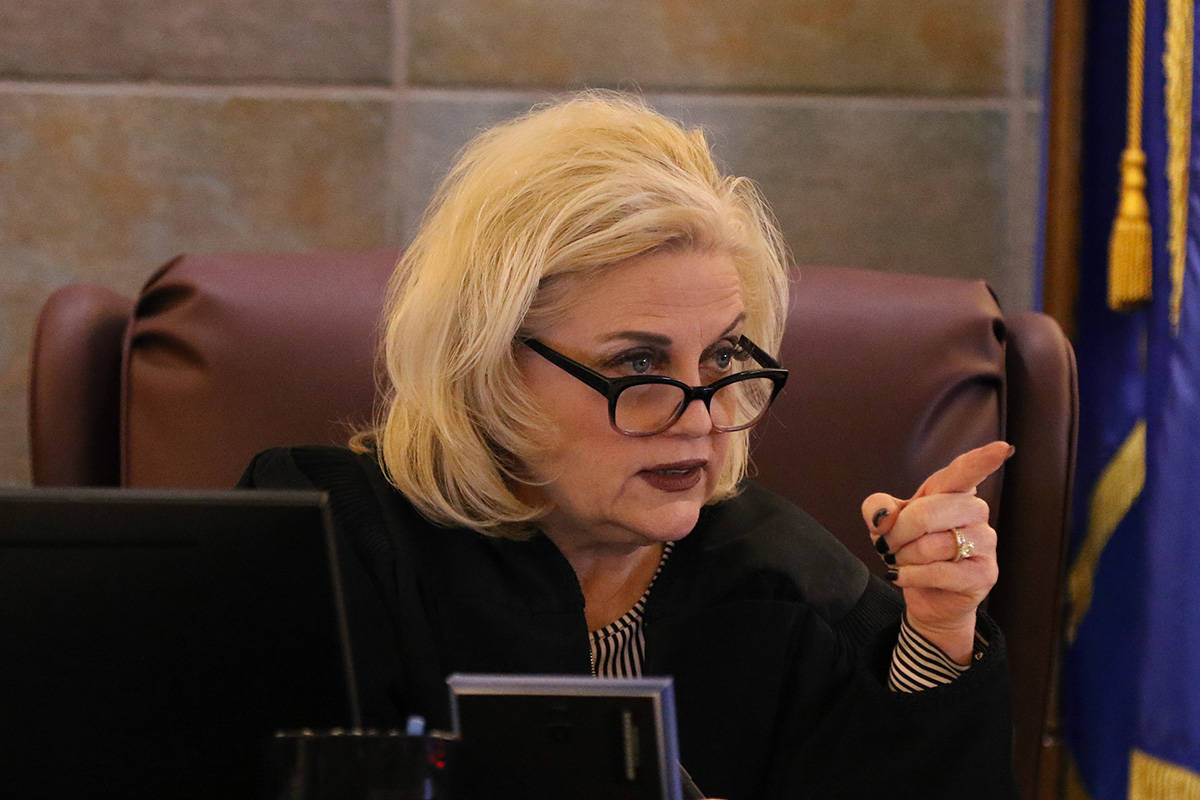Man accuses Las Vegas judge of personal bias in kidnapping case

A Las Vegas man appealing his felony convictions and decadeslong prison sentence has asked the Nevada Supreme Court to remove a judge from his case, alleging widespread corruption.
Attorney Michael McAvoyAmaya represents Marlon Brown, who sits in the Southern Desert Correctional Center, and argues that District Judge Michelle Leavitt has a personal bias against his client.
“Judge Leavitt’s fraud and judicial misconduct in numerous proceedings related to Marlon Brown demonstrate both her clear bias against Marlon Brown, and a shocking willingness to engage in fraud and deceit to cover her tracks,” McAvoyAmaya wrote in court briefs. “Judge Leavitt’s actions in this case were expressly intended to deny Marlon a fair trial, direct appeal, and habeas proceeding, and was insidious in its execution.”
Leavitt denied accusations that her daughter had ties to people who frequented a business Brown owned, and late last month Chief District Court Judge Linda Bell denied Brown’s request to disqualify Leavitt from the case.
“I am not aware of any connection between Mr. Brown and/or his business, and any of my immediate family members, including my adult children,” Leavitt wrote in an affidavit last month.
Battery, kidnapping charges
In the past two years, the judge oversaw Brown’s trial on battery and kidnapping charges for shooting his ex-girlfriend in the leg, ordered him to serve up to 45 years behind bars, sealed parts of his records and intervened in his appeal.
McAvoyAmaya laid out allegations against Leavitt in a 43-page petition to the high court on Tuesday, writing that “the magnitude and impunity of this blatant violation against Brown’s constitutional right to due process is astounding.”
The lawyer asked the Supreme Court to void any orders related to his post-conviction petitions and to prohibit the judge from entering any further judgments in the case.
Brown, 38, is the former owner of a now-closed clothing store that another judge, Las Vegas Justice of the Peace Melanie Tobiasson, has said was a front for an unlicensed club where teens drank, used drugs and engaged in prostitution.
His lawyer said Leavitt knew about Tobiasson’s allegations because her daughter had been physically attacked by people who frequented the establishment. Tobiasson presided over a hearing for those charged with battery against Leavitt’s daughter.
“My daughter was the victim of a battery case wherein the two defendants were female,” Leavitt wrote in an affidavit. “To suggest that several years later, in March 2018, I would have to recuse in the present matter strains all credibility. The assertion is I cannot do my job because my adult child was the victim of a battery. The two matters are not remotely similar and they took place years apart.”
Through her own lawyers, Leavitt called “blatantly false and defamatory” accusations that her daughter was involved with a Las Vegas pimp, whom Tobiasson said tried to lure her daughter into prostitution.
Judge’s unusual actions
Throughout Brown’s case, however, Leavitt took several unusual steps. At trial, she agreed to allow jurors to consider whether Brown was not guilty by reason of insanity, but ultimately pulled that choice from the verdict form. Less than a week after Brown’s sentencing in December 2018, Leavitt ordered key documents in his case sealed in order to block unspecified “personal identifying information.”
In July 2019, 10 days after Brown filed court papers in an appeal, Leavitt recused herself from that petition.
“To avoid the appearance of impropriety and implied bias, this Court hereby disqualifies itself and Orders the case be assigned at random,” she wrote.
A couple of weeks later, she withdrew from his criminal case for the same reason.
But before either case could be assigned to another judge, Leavitt delivered an 11-page “findings of fact, conclusions of law and order” regarding Brown’s petition.
The next day, District Judge Michael Villani, chief of the criminal division, sent the case back to Leavitt, saying her withdrawal was “filed in error.”
Brown’s lawyer said Villani did not have the authority to send the case back to Leavitt after she had withdrawn.
“This case is rife with extreme, insidious judicial, prosecutorial, and judicial misconduct to the point where it is unclear whether Marlon Brown can possibly receive any fair proceeding in the state of Nevada,” McAvoyAmaya wrote.
Meanwhile, Tobiasson is facing charges from the state’s Commission on Judicial Discipline, which alleged that she became improperly involved in a double murder investigation and personally targeted a man who was accused of ordering an attack on Leavitt’s daughter.
In a phone interview with the Las Vegas Review-Journal, Brown’s lawyer pointed out that Tobiasson had pressured the Metropolitan Police Department to shut down Brown’s store after Leavitt’s daughter was abused, and that was also after Tobiasson had presided over Brown’s case.
“Knowing those facts, can anyone honestly say that this is not an issue at least of implied bias?” McAvoyAmaya asked. “I don’t think so.”
Contact David Ferrara at dferrara@reviewjournal.com or 702-380-1039. Follow @randompoker on Twitter.